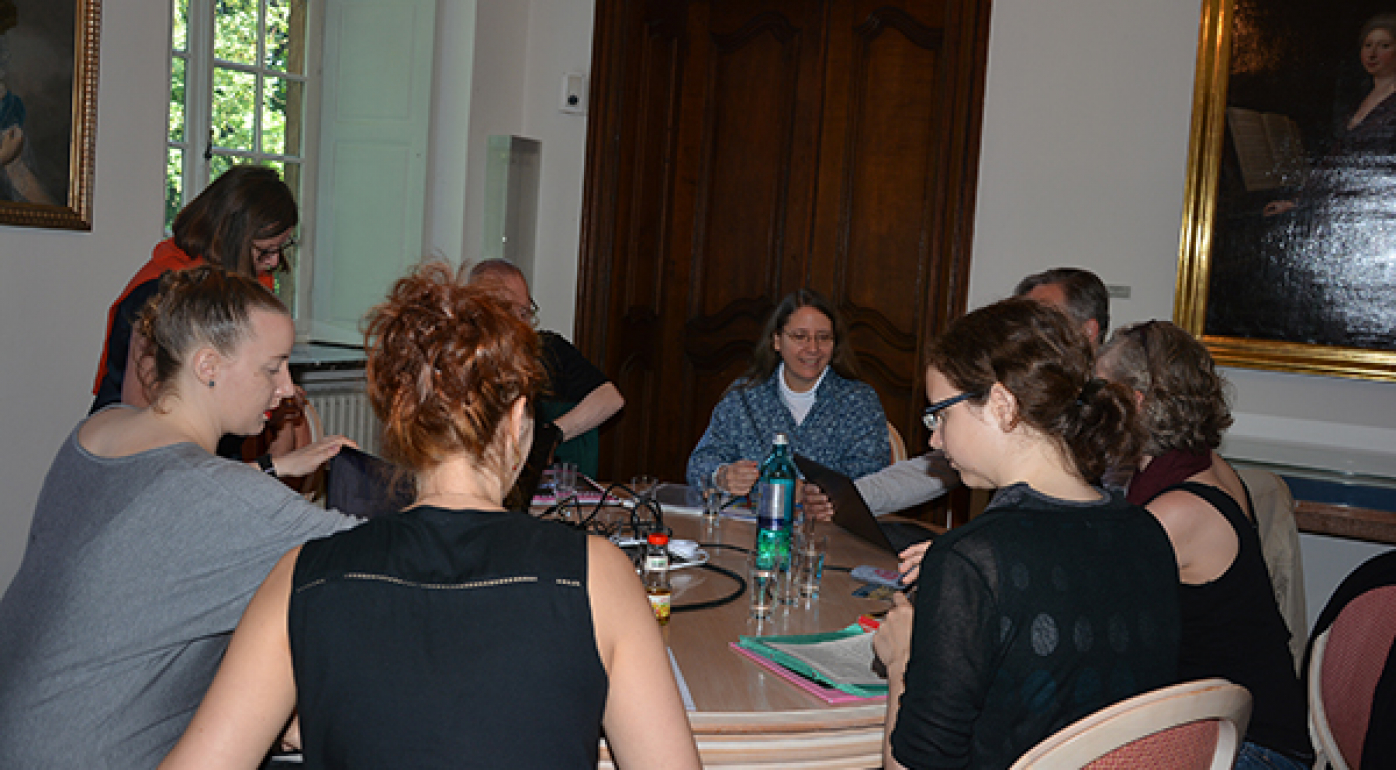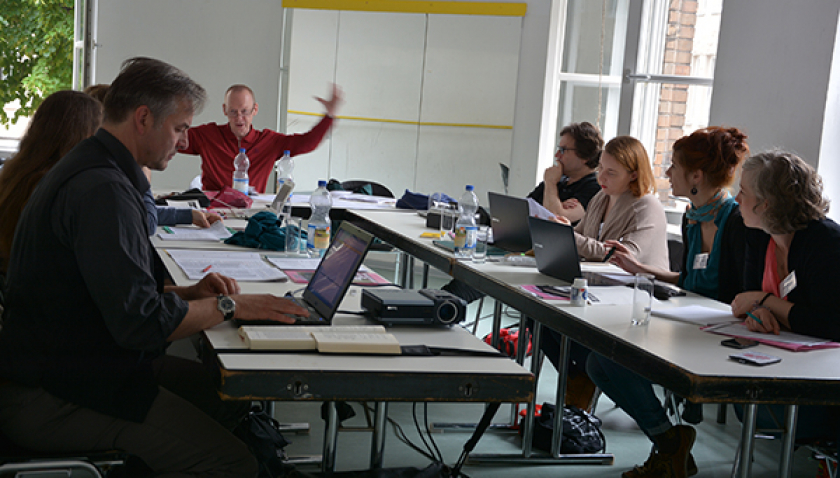Word of the day 3: 'no'
A note on ‘no’
Allow us to introduce:
No.
A small word, unassuming and assumably easy to translate.
You’d think so, wouldn’t you? Yet, in our group, it led to the most heated discussion of the week.
After examining the character of Falstaff, considering his rakish, bombastic, outgoing personality, a man who enjoys life – mainly at the pub - we made a conscious decision to render his voice in a way that would reflect this particular way of living. The utterances in the speech we were about to translate seem to come from his gut. Thus, encountering the first ‘no’ in this passage, we unanimously decided (that’s right, no quarrel, for a change!) that the standard German ‘nein’ would be uncharacteristic. We discussed two, more colloquial, options - ‘nö’ and ‘nee’. Speaking the words out loud emphasised with wild gesticulation by the actors amongst us, it became clear that ‘nee’ was more performable as it allowed for more choices in vocalisation. ‘Nee’ was then employed for the following 6 ‘no’s, reproducing the repetition in the original text.
With this pivotal decision we had, as a group, established the overall tone of the speech, however the real issue was raised (as were voices) when our typist, crucially, dropped the last letter of a word.
“Why did you do that?”
“Because that’s how I want it to be spoken.” (…grunting noises)
Can a translator do that? Despite a collective conviction that Falstaff speaks in this colloquial manner, we were not sure whether this should be spelt out in the text. While some of us argued that by determining the elocution we were depriving the actor of playing choices, our workshop leader, Michael, an experienced dramaturge, pointed out that there is a tradition of clear pronunciation on the German stage. Actors are trained to deliver their lines in Hochdeutsch (the German equivalent to the English RP) unless the script explicitly indicates otherwise, i.e. if the script says lalala, the actor will say lalala and not lululu.
We wanted Falstaff to say lululu!
In other words, we felt it was important to produce a non-standard German text that would avoid a misrepresentation of Falstaff by even the most pedantic German actor. Hence, dropping letters (e.g. ‘nich’ instead of ‘nicht’) was condoned by the group and logically led to integrating contractions (e.g. ‘oder’n’ instead of ‘oder einen’), establishing Falstaff’s register. And the group was on the same page again.
What is ‘no’? A word. What is in that word ‘no’? The potential to spark off a general debate about register in Shakespearean language? An examination of the role of the theatre translator? A meticulous look into theatre traditions in modern Germany? Perhaps. A small word? Nope.
By Jana Mischke and Wiebke Acton
Word of the day 2: 'Saints' - the pilgrimage of the muse
Translating Romeo and Juliet took us on a pilgrimage – the destination being a kiss of inspiration. We were hoping to unite both the beauty of Shakespeare’s language and its theatrical potential. The scene we translated was the star crossed lovers’ first encounter: One teenager, Romeo, wants to impress Juliet, a girl he meets at the ball. He approaches with beguiling words, using the poetic structure of a sonnet, comparing her to a saint and himself to a pilgrim.
The challenge we faced in translation was an abundance of religious imagery which made the text, in our opinion, rather inaccessible for a modern audience. Hence, in our translation approach we focused on a direct and clear language, choosing vocabulary that young people would use nowadays. At the same time we tried to avoid slang expressions as they seemed too far removed from the Shakespearean language and the beautiful poetry in this particular sonnet. Let us take the following line as an example: “Saints do not move, though grant for prayer’s sake” meaning that Juliet welcomes Romeo’s advances but does not take any step towards him.
The German word for “saints” (Heiliger), here used by Romeo to address Juliet, carries all the religious meaning, but seems stiff and outdated for our translation. We opted for “Engel” (angel), which maintains the religious image while transferring a sense of flirtation or intimacy as it can easily be used as a term of endearment, and we considered it appropriate in this charged dialogue.
We came up with a phrase that has a double meaning: “Ein Engel regt sich nicht, er lässt dich kommen”: An angel does not move, they make you come. The word “come” refers to the movement and also has a sexual innuendo which younger German spectators would grasp immediately.
Thus Romeo gets his kiss by Juliet and we were kissed by inspiration.
Christian Leonhard and Yvonne Jäckel
Word of the day 1: translating the phrase from Hamlet's 'to be or not to be' soliloquy: ‘tis a consummation devoutly to be wish'd
Das wär doch mal ein Abgang - Wie im Buch.
Coming from different backgrounds, our group first had to establish a convenient methodology. That might sound very German but it was an important decision which allowed us to work efficiently - once we got there. Our approach was basically to operate like a sculptor, our first rough draft being the stone and hereby a solid base of our work. Taking this as a starting point we shaped our stone until it was the way, we wanted it to be: understandable for everyone at once. However, we still wanted it to be poetic and in blank verse. During this creative process we faced a lot of challenges, one of which was the phrase:
’tis a consummation devoutly to be wish’d.[1]
The solution which we finally decided on was: „Das wär doch mal ein Abgang - Wie im Buch.“
The equivalent in English would be comparable to: “This would be a textbook example of an exit.”
“Abgang” is a word, which can be used in various senses. It can simply mean to leave or imply to die. However, it can also stand for to exit, in the sense of leaving the stage. Considering the fact that “Hamlet” includes a tremendous amount of references to theatre, we found this phrase to be a good solution for the character of Hamlet. When it comes to putting the play in action an actor would thereby have many possibilities to play the word – maybe even using the implication as a key to a possible self-reflection of a Hamlet on stage. Thus, the most striking part of the translation is that the verse gets a multilayered twist. Moreover it sounds equally poetic as it sounds contemporary.
The expression “Wie im Buch“ (a textbook example or maybe by the book) does not imply anything boring or scholarly, as one could think. In German, the expression means that something is as perfect an example of its kind as one could only imagine. Just like it is the case above, this can be seen as a theatrical reference thinking of Hamlet as a drama, a book.
Of course this wasn’t our first idea. We worked our way through our stone, beginning with “Das wär doch mal ein wünscheswertes Ende.” (That would be an ending to be wished for). We added and deleted, discussed and fought, reflected and revised. Up until we got rid of all the bits and pieces which didn’t fit, to finally contemplate our sculpture.
by Johanna Ott and Xenia Wierzbicki
[1] William Shakespeare: Hamlet– III/1
Read the Romanian translators' blog here.
Read the Polish translators' blog here.
The bloggers are taking part in A Great Feast of Languages workshop in Cologne. A Great Feast of Languages is a year-long international focus on translating Shakespeare for performance, involving a series of translation workshop programmes and a chain of public panel discussions between British and international translators, writers, academics and practitioners. Find out more below.

